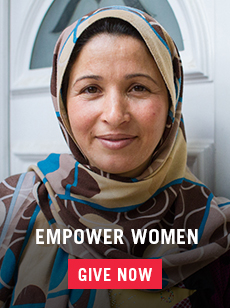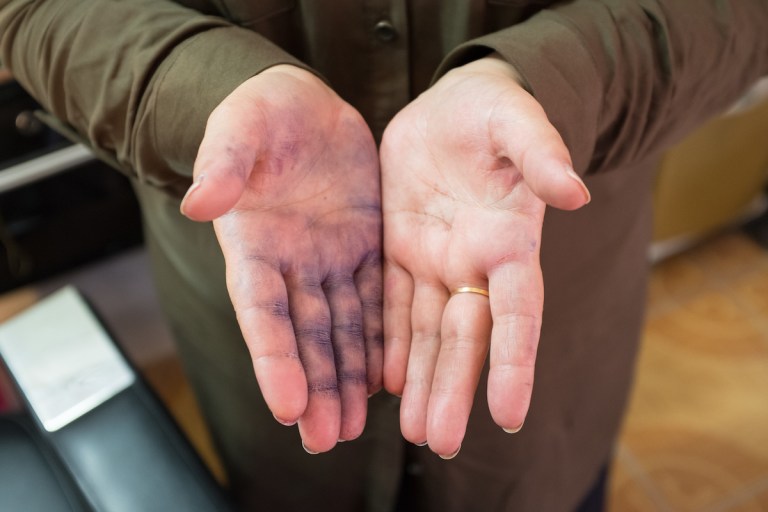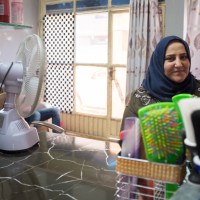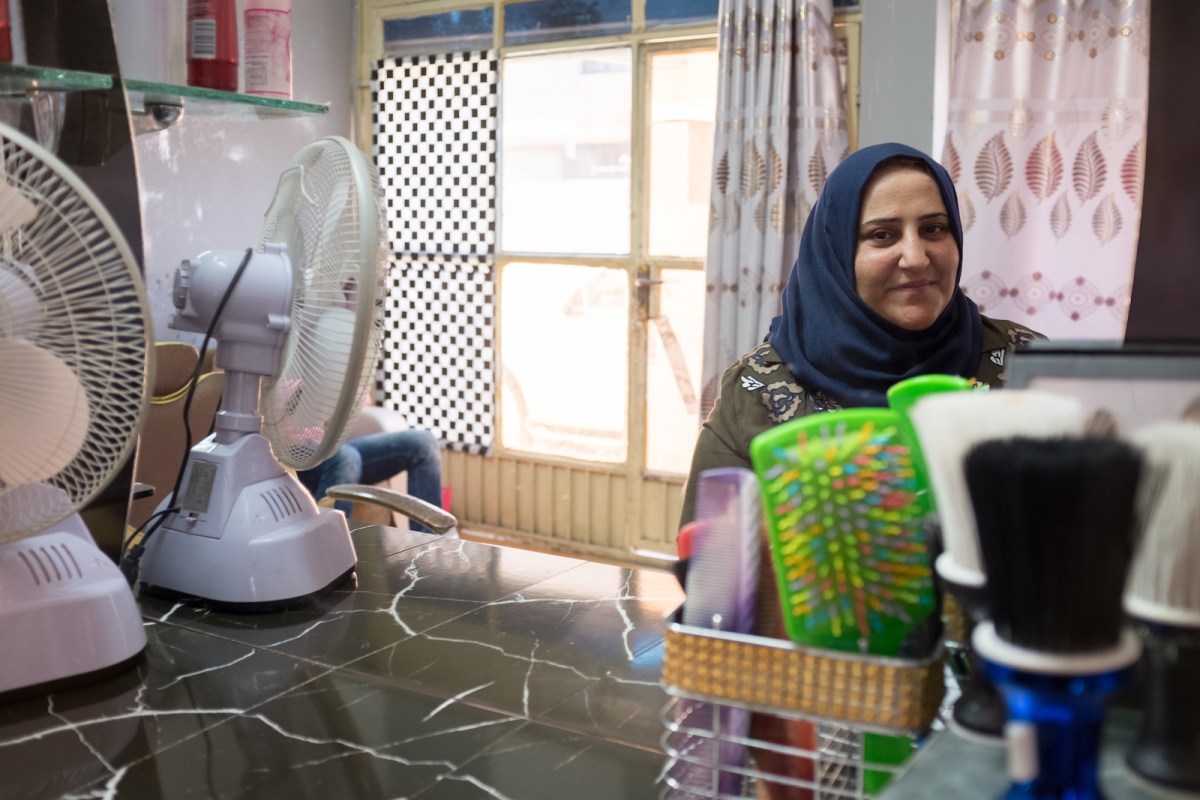Saba was ready to go the minute she heard a knock on her apartment door, but she stayed silent. A second knock, then a third… it wasn’t until she heard familiar voices calling out from the other side that Saba exhaled in relief, opened the door, and stepped outside with her son, carefully dressed head-to-toe in loose black coverings.
This was ISIS-held Mosul, after all.
The voices belonged to the father and brother of one of her customers. They’d come to bring Saba to their home. She carried her supplies in bags tucked into the fabric folds. She could not risk exposure now—that would be deadly.
Saba and the family took the back streets to avoid ISIS spies. They walked quickly. Making sure they weren’t seen, they slipped through a courtyard gate and in through the house’s front door. Saba continued further into the house alone, to where she heard loud voices.
Saba peeled off her outer clothing and went round exchanging greetings. In the relative security of an inner room, she opened her bag of supplies and tipped everything out onto a table:
Combs, a hair dryer, scissors, hairpins, and large cans of hairspray. In the eyes of ISIS… contraband.
Saba is a beauty salon owner, and was here secretly to get a bride ready for her wedding day—hair, nails, eyebrows.
Everything they were doing was illegal under ISIS. This could cost Saba her life.
The erasure of feminine beauty
As ISIS conquered territory throughout Iraq and Syria and established their violent notion of a “Promised Land”, they set out rules for living that are strictly enforced. The pressure to conform to their ideology is huge, and punishments for disobedience—even small infractions—is severe.
In the ISIS caliphate, men and women are expected to be modest, and to dress modestly in public. For men, that includes the length of their pants and the wearing of a beard. For women, in public, it includes complete coverage and no decoration. Women can’t show any part of themselves—not their form nor their faces, not their eyes nor their hands.
In fear, residents comply. But ISIS’s definition of modesty goes even beyond public appearance, making life impossibly difficult for many women trapped in the caliphate.
Not only are women not allowed to express themselves in public with color, pattern, or style—they are forbidden from visiting salons to take keep up with basic self-care. Worst of all, ISIS cultivates networks of spies who follow women, report any infraction, and deliver punishment. Fear and suspicion breaks the bond between women—neighbors—cultivated over lifetimes. 
The importance of dignity
For Saba, making women feel seen and valued has always been an essential part of her work. Even in the worst of circumstances, Saba understands that women want to feel like themselves.
As ISIS rule stretched from weeks to months, Saba’s clients grew impatient with the new social restrictions. Risking their own lives, they sought her out for haircuts and colouring, waxing and manicures.
“After ISIS came we had to return to our normal lives,” she says. “We had to find a way out of our bad mood because of oppression and injustice and sorrow. Life had to continue, to not stop.”
Strangers on the street couldn’t be trusted, so many clients were afraid to be seen near Saba’s salon. They sent their husbands and sons to ask Saba to come to their homes instead. That put additional risk on Saba, but she remained committed to her clients.
Courage in the face of fear
Under ISIS, hair dye on her hands could have earned her a public flogging and worse. Much worse.
All throughout ISIS’ rule in Mosul, she continued to practice her craft. ISIS shut her salon down four times, eventually stripping her shop of all of its contents. But she continued on. Her family needed the income she provided, and her clients needed the hope she fashioned from her beauty skills.

ISIS militants paid random visits to her salon and home, always on the hunt for tell-tale signs that she was continuing to work. They always came in the days leading up to holidays, when women often visit salons.
Even now, after Mosul is liberated, her heart races when she hears a knock at the door.
“ISIS came anytime without telling me,” Saba says, matter of factly. “Actually, all my city and neighbors are ISIS.”
The power of community and trust
Saba’s salon offers more than haircare and manicures. This is the kind of place where the bonds of community, broken by years of ISIS rule, can be reknit.
“I have a good relationships with my customers,” Saba says. “They share their stories of their husbands and children, and I give them some advice. I listen to them and try to comfort them. I hear a lot… I was full of their stories until I might burst! But it was fine, because I knew how to comfort them.”
The bond between hairdresser and client—it’s real in Iraq too. And that bond works two ways.
“One time when ISIS came, they saw I had a customer. They took everything from my shop and told me to go home and bring the hair dryer from my apartment. My customer encouraged me to tell him it belonged to a friend, so I told him that—and he did not take it.”
“If ISIS entered the shop when I had customers, the customers pretended they were workers in and there were no customers in the shop—to protect me.”
“My customers really care for me.”
Imagine yourself in Saba’s salon
ISIS has been pushed from Mosul, and Saba has regained the ability to practice her craft in the open. For years she risked public torture and her very life to continue serving her clients—to preserve their trust, community, and dignity.
You are there with Saba, in that corner shop in liberated Mosul. You are there in the salon chairs, dryers, and supplies you put into Saba’s hands—restoring what ISIS took from her, and allowing to do more with her skills, courage, and enthusiasm. You restored her salon and her hope that life can be normal again after ISIS.
Imagine if Iraq was filled with women empowered like Saba, who have the tools they need to turn their dreams into reality—and return dignity to the women in their communities.


